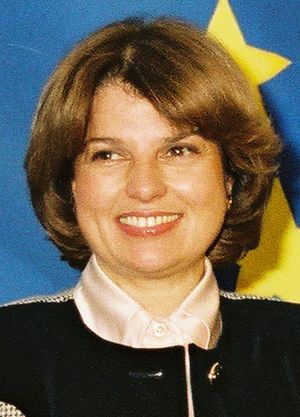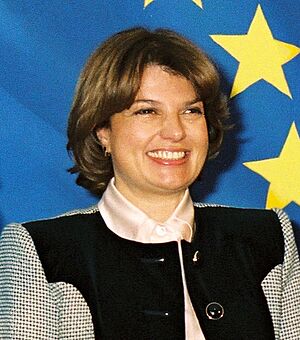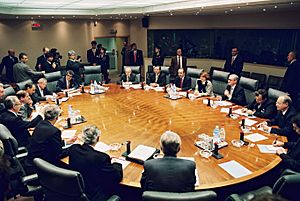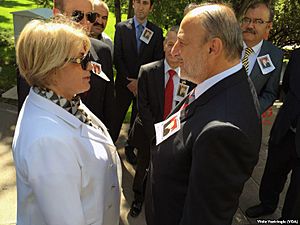Tansu Çiller facts for kids
Quick facts for kids
Tansu Çiller
|
|
|---|---|

Çiller in 1994
|
|
| 22nd Prime Minister of Turkey | |
| In office 25 June 1993 – 6 March 1996 |
|
| President | Süleyman Demirel |
| Deputy | Murat Karayalçın Hikmet Çetin Deniz Baykal |
| Preceded by | Süleyman Demirel |
| Succeeded by | Mesut Yılmaz |
| Deputy Prime Minister of Turkey | |
| In office 28 June 1996 – 30 June 1997 |
|
| Prime Minister | Necmettin Erbakan |
| Preceded by | Nahit Menteşe |
| Succeeded by | İsmet Sezgin |
| Minister of Foreign Affairs | |
| In office 28 June 1996 – 30 June 1997 |
|
| Prime Minister | Necmettin Erbakan |
| Preceded by | Emre Gönensay |
| Succeeded by | İsmail Cem |
| Minister of State (Responsible for Economy) |
|
| In office 21 November 1991 – 25 June 1993 |
|
| Prime Minister | Süleyman Demirel |
| Leader of the True Path Party | |
| In office 13 June 1993 – 14 December 2002 |
|
| Preceded by | Süleyman Demirel |
| Succeeded by | Mehmet Ağar |
| Member of the Grand National Assembly | |
| In office 20 October 1991 – 3 November 2002 |
|
| Constituency | Istanbul (1991, 1995, 1999) |
| Personal details | |
| Born |
Tansu Penbe Çiller
24 May 1946 Istanbul, Turkey |
| Political party | True Path Party |
| Spouse |
Özer Uçuran
(m. 1963; died 2024) |
| Children | 2 |
| Alma mater | Robert College University of New Hampshire University of Connecticut Yale University |
| Signature | |
Tansu Çiller (born 24 May 1946) is a Turkish academic, economist, and politician. She made history as Turkey's first and only female prime minister, serving from 1993 to 1996. She also held important roles like Deputy Prime Minister and Minister of Foreign Affairs.
As a Professor of Economics, Çiller first became a Minister of State for the economy in 1991. When the Prime Minister, Süleyman Demirel, became President in 1993, Tansu Çiller took his place as the leader of the True Path Party and became Prime Minister. During her time as prime minister, there was an ongoing conflict between the Turkish Armed Forces and the Kurdistan Workers' Party (PKK). Her government worked to strengthen national defense. She also helped persuade the United States and the European Union to recognize the PKK as a terrorist organization.
In 1995, her government signed an important agreement called the EU-Turkey Customs Union. This agreement helped Turkey's trade with European Union countries. After the 1995 general election, she continued as Prime Minister by forming a coalition government. She later served as Deputy Prime Minister and Minister of Foreign Affairs until 1997.
Contents
Early Life and Education
Tansu Çiller was born in Istanbul, Turkey. Her father, Necati Çiller, was a journalist and a governor. Her mother, Muazzez Çiller, was from Thessaloniki.
Çiller studied economics at Robert College Yüksek, which is now called Boğaziçi University in Istanbul. After that, she went to the United States for more studies. She earned advanced degrees from the University of New Hampshire and the University of Connecticut. She also did further research at Yale University.
Later, Çiller taught economics at Franklin and Marshall College in Pennsylvania. In 1978, she became a lecturer at Boğaziçi University in Istanbul. By 1983, she was a professor there.
Start of Her Political Journey
Before entering politics, Tansu Çiller was known for her economic studies. She also worked as a consultant for the Mayor of Istanbul for a short time. In December 1990, she joined the True Path Party (DYP). She quickly became a deputy president, focusing on the economy.
In the 1991 election, Çiller was elected to parliament as a representative from Istanbul. The DYP won the election and formed a government with another party. Prime Minister Süleyman Demirel appointed Çiller as a Minister of State in charge of the economy.
In 1993, President Turgut Özal passed away. Prime Minister Demirel was then elected as the new President. This left the position of Prime Minister and leader of the DYP open. Tansu Çiller became the new leader of the party. On June 25, 1993, she became the first and only female Prime Minister of Turkey. She continued the coalition government with some changes.
As Prime Minister (1993–1996)
During her time as Prime Minister, Tansu Çiller focused on strengthening Turkey's economy and national defense. She aimed to make the DYP party more conservative. She was the only woman in her cabinet until 1995.
Çiller played a big part in changing Turkey's economic rules. These changes were known as the "5 April Decisions" and helped Turkey get funding from the International Monetary Fund (IMF).
Dealing with Conflict
Her time as Prime Minister saw an increase in the conflict between the Turkish Armed Forces and the PKK. Çiller made many changes to national defense. She worked to modernize the Turkish Army. With a better-equipped military, her government successfully convinced the United States and the European Union to list the PKK as a terrorist organization.
However, during this period, there were reports from international human rights groups. These reports mentioned that some Kurdish villages were destroyed and that Kurdish civilians were killed by the Turkish military.
Public Concerns
During her premiership, some questions were raised about connections between the government and certain groups. There were also concerns about her financial dealings and how some government funds were used. Her popularity was also affected when a newspaper reported about properties she owned in the United States.
International Relations
A major international agreement, the EU-Turkey Customs Union, was signed in 1995 and started in 1996 during Çiller's government. This agreement helped improve trade between Turkey and the European Union.
In 1995, there was an attempted coup in Azerbaijan. Later reports suggested that Çiller's government might have supported this attempt. In January 1996, there was a disagreement with Greece over some small islands called Imia/Kardak. Çiller was also the first Turkish Prime Minister to visit Israel and meet with Yaser Arafat.
Later Political Roles
After the 1995 general election, Çiller remained Prime Minister for a while. She then formed a new government with another party leader, Necmettin Erbakan, in 1996. In this new government, Çiller served as Minister of Foreign Affairs and Deputy Prime Minister.
In 1996, a major event known as the Susurluk scandal happened. This scandal showed that there were close ties between some government officials, security services, and certain groups. This led to public protests.
In 1997, there were growing tensions between the government and the military. The military was concerned about the government's commitment to secularism, which means keeping religion separate from government. After a meeting, the military presented a list of demands to the government. This led to the resignation of Erbakan's government in June 1997.
End of Her Political Career
After the government fell, Tansu Çiller faced investigations by the Turkish Parliament regarding corruption claims. However, she was later cleared of these charges.
In the 1999 general election, her party's support decreased. She was still re-elected as the party leader. However, in the 2002 general election, her party did not get enough votes to have representatives in parliament. This led to her resignation as party leader and her decision to leave active politics.
After Politics
Tansu Çiller is a member of the Council of Women World Leaders. This is a group of current and former women presidents and prime ministers. Their goal is to bring together top women leaders to work on important issues for women and fair development around the world.
In 2018, Çiller attended a political rally to support Recep Tayyip Erdoğan's campaign for president. In February 2024, she supported Murat Kurum for the Istanbul mayoral election.
Personal Life
Tansu Çiller speaks English and German fluently, in addition to Turkish. She had two children with her husband, Özer Uçuran Çiller. Her husband passed away on June 1, 2024.
See also
 In Spanish: Tansu Çiller para niños
In Spanish: Tansu Çiller para niños
- Türkan Akyol
- Women in Turkish politics
- Female political leaders in Islam and in Muslim-majority countries
 | DeHart Hubbard |
 | Wilma Rudolph |
 | Jesse Owens |
 | Jackie Joyner-Kersee |
 | Major Taylor |




